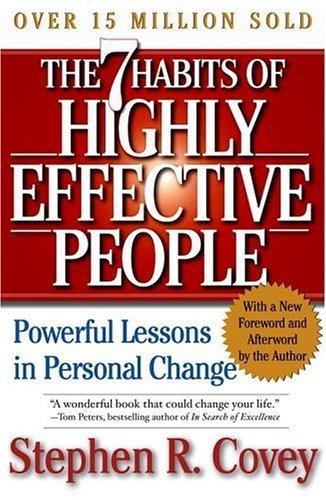Our book choice for November 2004 is The 7 Habits of Highly Effective People by Stephen R. Covey. It was first published in 1989 and has since become one of the best-selling books of all time, with over 25 million copies sold. The book has been translated into 40 languages and has been used by businesses, schools, and organizations around the world.
The 7 Habits is a self-improvement guide that teaches readers how to be more effective in their personal and professional lives. The book is divided into four parts:
- Private victory: This part of the book focuses on developing personal character and principles.
- Public victory: This part of the book focuses on developing interpersonal skills and relationships.
- Creative cooperation: This part of the book focuses on working effectively with others to achieve common goals.
- Principle-centered leadership: This part of the book focuses on becoming a more effective leader.
In addition to the 7 Habits, The 7 Habits of Highly Effective People also includes a number of other insights and principles that can help you to improve your life:
- The importance of character and integrity
- The need for balance in life
- The power of teamwork
- The importance of continuous learning
The book discusses the importance of self-awareness, self-management, and relationship management. It also talks about the importance of living with integrity, humility, and service. The book has also been the subject of numerous studies, which have found that it can be an effective tool for improving personal and professional effectiveness.
Discussion Questions
- Talk about the difference, as Stephen Covey describes it, between Personality and Character ethics. Does that distinction have relevance to your life? According to Covey, what is the disadvantage of relying solely on the Personality ethic?
- Discuss the “absolute” principles that Covey believes exist in all human beings, those basic assumptions underlying the Character Ethic.
- What does the experiment using drawings of a younger and older woman tell us about individual perception?
- What is Covey’s “inside-out” approach to effectiveness?
- Discuss Covey’s definition of “habits” and the role they play in our lives. What are habits, as Covey defines them?
- Talk about the stages that habits help us move throug — Dependence/ Independence/ Interdependence. Why is Independence not the optimal model to follow in personal or professional environments?
Now move on to the 7 specific habits:
- Be Proactive: What does it mean to be proactive? What qualities are needed to be proactive? Can you discern in your own life the difference between what you can influence and what you cannot? How proactive are you in your job…in your daily life?
- Begin With the End In Mind: How do you define your own personal principles? Have you established a mission statement? What would (or does) it consist of? If you haven’t already, develop your personal mission statement.
- Put Things First: What are the key roles you take on in life? How can you integrate those into your mission statement?
- Think Win/Win: What is win/win, and why does Covey believe it is important? Give an example from your own experience where you achieved (or not) a win/win situation?
- Understand/Understood: why does Covey consider this principle so important? What does he mean by it…and how is it relevant to your life?
- Synergize: What does synergy mean and how does it apply to personal effectiveness? How does it differ from the Win/Win principle? Can you think of how synergy might work in your own life—personal or professional?
- Sharpen the Saw: How does this habit relate to personal renewal? What does Covey mean by achieving “balance”? How does one maximize producing vs. the capacity to produce? Can you apply this principle to your own situation?

